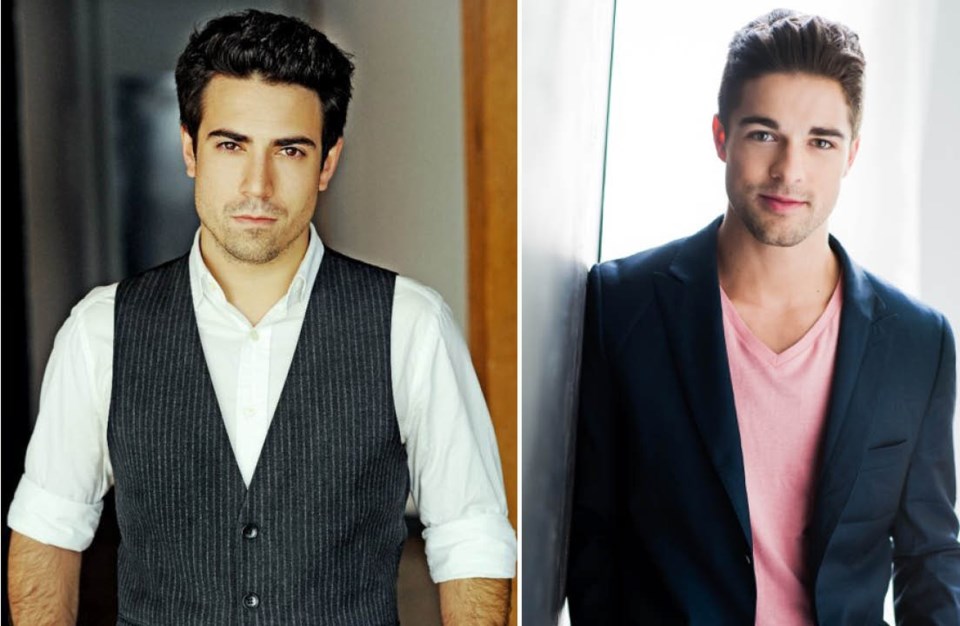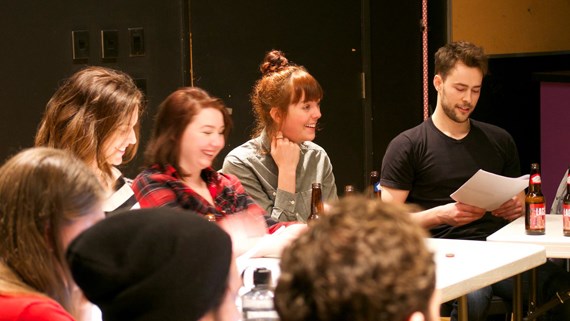Seven new, starkly different plays will see their debut this weekend at the fifth annual Pull Festival.
Playfully dubbed “the YouTube of theatre”, the Pull Festival gives select 10-minute plays – created entirely by playwrights, actors and artists from Vancouver’s independent theatre community – a place to launch, and audiences the chance to enjoy a wildly diverse evening of original content.
Seated in the Westender offices one sunny afternoon last week, festival creator and co-artistic director Kayvon Kelly explains what sparked the idea way back in 2012.
“My acting teacher had introduced me to the concept [of the 10-minute play] and I’d always really loved them as a format […] so we went for the festival as a one-off,” the raven-haired actor/director recalls. “It was never supposed to happen again; we thought it would be really fun, let’s just throw this thing up. And then we booked our space and we had everything in motion – we were scheduled in January – […] and someone came up to me and they were like, ‘Oh wow, are you a part of PuSh?’”
Realizing the gravity of his mistake, booking his indie theatre event in the middle of one of the largest arts festivals in Vancouver, Kelly tried everything in his power to reverse the momentum.
“I tried to get my money back, tried to reschedule, but nothing could shift so we just went for it,” he says with a laugh, “And then I said well, if we’re during PuSh then I’m going to call it Pull.”
The festival was a resounding success, selling out every night. Even more telling, the response from the artists was so enthusiastic that Kelly says he had no choice but to organize it again the following year. Meanwhile, a tight-knit community – one that largely operates outside Vancouver’s mainstream theatre scene – quickly sprung up around it, with artists returning year after year, and some of their ideas going from the Pull Festival testing ground to stages around North America.

“I moved to Vancouver [from Winnipeg] four years ago now, and I heard about Pull my first year here,” says Markian Tarasiuk of SpeakEasy Theatre, seated next to Kelly in the Westender boardroom. “Mike, the other half of my company, was involved last year as an actor and had the best time doing the festival.”
As part of Pull’s five-year milestone, Kelly and his company, Sum Theatre, invited SpeakEasy on board this year as a producer to help grow the festival and establish it further.
“It’s a great union for us because, yes, we want to elevate the festival, but we don’t want to lose the raw, fun environment,” Kelly explains. “I don’t want it to become another uppity festival,” he adds. “[Sum Theatre and SpeakEasy] have the same sort of ideals and mandate for us in terms of what the festival should be like.”
To that end, there will still be cheap beers and funny, informal segues between plays, but the festival will now take place in its biggest house yet: Studio 1398 on Granville Island. That means increased capacity (from the 60 people at Little Mountain Gallery to 80+ now per night) and better amenities for the artists (namely, dressing rooms, a beer sponsor, and no more waiting in the alley outside the venue to make their entrance...).
The festival is also built on a profit-share model so, after costs are covered, any additional revenue is split equally between all the participating cast and crew.
Simply put, everything about the Pull Festival represents theatre for and by a new generation, engaging not only a unique cross-section of talent from Vancouver’s deep theatre community, but attracting a younger audience who perhaps feel theatre is more their parents’ domain.
It’s also wholeheartedly embracing its time and place, aiming for more diversity and gender representation in its lineup.
“It’s a big battle right now, across the country but Vancouver as well,” Kelly admits, adding that getting ethnically diverse actors into the casting room is a constant, systemic struggle. “But because we’re a festival that includes a large number of people – we have seven writers, 15 to 18 actors, and three to four directors – one of the big things that we’ve pushed from the beginning is gender balance. So this year we have three female directors, and I think we’re a majority female writing team.”
From that team, this year’s subject matter ranges from Sean Oliver’s sombre examination a true-life event – the drowning of a homeless man in Winnipeg’s Red River – to Pippa Johnstone’s comic “wo-mance”, in the vein of acclaimed web series Broad City.
For writers tossing around wacky ideas, or beginning playwrights who have never had their work produced, Pull acts as an incubator of possibility, complete with costumes, lighting, sound and a professional stage management team. The focus remains squarely on the writing, though.
“Theatrically, the focus has always been on text and character,” says Kelly. “One of the things we’ve always told our writers is, ‘Don’t write in a helicopter or fog machines.’ Like, that’s not going to happen…,” he laughs. “But that said, we have a lighting designer, sound designer, costuming, minimal set design, due to the fact that we have to facilitate seven different shows which are seven different worlds.”
The 10-minute, minimal-rehearsal model also entices a wide variety of actors who may not typically have time for theatre commitments in their film and television schedules. Names attached to the 2016 festival include Mayumi Yoshida (The Man in the High Castle), screen and stage actor David Lloydy, and acclaimed autobiographical playwright and lighting designer Itai Erdal (How to Disappear Completely), appearing for the first time in a role that is not simply himself.
For two-time Pull Festival playwright Cheyenne Mabberley, missing out on having a play in this year’s festival gave her an opportunity to participate as an actor for the first time.
“I go to Pull Festival every year,” the bubbly Studio 58 grad explains, by phone. “We [she and collaborator Katey Hoffman] wrote a piece this year and we weren’t super happy with it and it didn’t make it into the festival, and I thought, well I want to be involved still! So I auditioned and I luckily enough got a role.”
Mabberley will play Ree in Lauren Jackson’s play of the same name, which looks at the impact of trauma as it evolves over time.
“I had no idea what I would be cast in, because they have all the directors present, and you do a short monologue,” she recalls. “And then they handed me sides from several different shows and I had to get up with another actor and cold read a part. [...] It was very exciting because, of course, I didn’t know what these plays were, so to get to see a little teaser of each play was really exciting and fun.”
Best known for their sketch comedy duo the After Party Girls – two drunk girls in search of an after-party – Mabberley and Hoffman created that idea for Pull in 2013, and Mabberley explains that they likely wouldn’t pursued it if not for the festival.
“We saw the posting for the festival in its second year […] and we wrote a show on our dinner break at theatre school. We thought, ‘Oh this is such a cool festival!’ We had this silly idea and it was the perfect venue for it because it was only 10 minutes.”
The two have gone on to expand The After Party into a full-length play, which will appear on the main stage at this year’s Vancouver International Fringe Festival, as well as create four other works starring the two characters.
In other stepping stones, Pull Festival co-artistic director Pippa Mackie had her first Pull play, Bait, optioned for a screenplay in 2012, while last year her political comedy, Deer Harper (the story of a romance between Stephen Harper and a deer), went on to further life at the SHIFT Festival at the Cultch.
That many of these ideas are able to withstand closer creative scrutiny is a testament to the strength and complexity of the 10-minute play.
“It is a really difficult model,” Kelly admits. “I always compare it to the novelist and the short story: a lot of novelists say the short story is harder because you have to be a lot more concise, a lot more clear, and know what you’re doing.”
• The fifth annual Pull Festival runs March 24-26 at Studio 1398 (1398 Cartwright, Granville Island), 8pm. Tickets $15; only available at the door.


